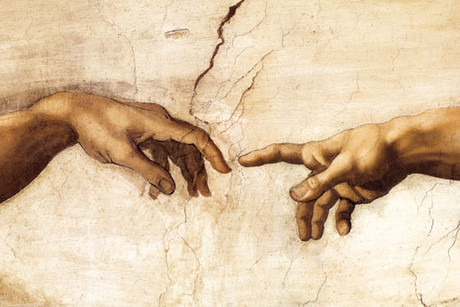Ever since the changes in the translation of the Mass prayers I’ve been noticing that Eucharistic Prayer II has this newly translated line, which comes just after the words of consecration:
“Therefore, as we celebrate the memorial of his Death and Resurrection, we offer you, Lord, the Bread of life and the Chalice of salvation, giving thanks that you have held us worthy to be in your presence and minister to you.” (Bolding my own)

God is reaching out to us in collaboration
Woah – We’re talking about ministering to God? I thought God ministers to us! Jesus came not to be served but to serve, right? The previous translation said, “We thank you for counting us worthy to stand in your presence and serve you.” I was fine with serving God but the word minister has such a deeper meaning. It can seem a bit backward. When we talk about ministry the direction would tend to be from God through me to the person I’m serving. Ministry is serving others in the name of and with the help of God. If we have a ministry to God, as the prayer says, it would seem that the arrow is pointing the other direction, from me to God.
There are a few things to note in this. The word comes from the Old French ministre or servant. Ministering is simply about service. In countries other than the United States government agencies are named ministries (e.g. The Ministry of Education, the Ministry of Defence). I like that nomenclature because it gives a sense of care. The Ministry of Health sounds a lot nicer than the Department of Health. The prayer says that God has held us worthy to minister to (or serve) him. Being able to serve is a gift because it’s what we were ordained to do out of love. And why should we care for God? Saint Ignatius would say that because it’s a loving response for the care God has given to us. It’s our purpose to praise, reverence, and serve God (see “Is God selfish?” and “What’s my purpose?”); it’s the Principle and Foundation.
After Jesus spent 40 days in the desert the Gospel of Matthew says, “Then the devil left him and, behold, angels came and ministered to him.” (Matthew 4:11, NAB) Other translations say the angels “helped him” or “took care of Jesus’ needs”. Jesus was human and endured great hardship in the desert. The angels’ purpose was to care for him. I think we need to ask ourselves, In what way do I need to minister to God? It may not be in the way Jesus needed care in the desert, but it can mean service to God by service to others.
Jesus told the parable of the King separating the sheep from the goats. (See Matthew 25) The King said, “I was hungry and you fed me, thirsty and you gave me a drink; I was a stranger and you received me in your homes, naked and you clothed me; I was sick and you took care of me, in prison and you visited me.” When, they asked, did they do all those things for him? “The King will reply, ‘I tell you, whenever you did this for one of the least important of these followers of mine, you did it for me!'” By ministering to others’ needs, we literally minister to God.
But service can also mean prayer. It can mean intentional discernment about our life’s vocation and purpose. How are we going to help God in his project for the world?
Here’s a fresh paraphrase of the prayer at the beginning of this post. Make it your own.
Lord, we thank you for being with us, for loving us, and for giving to us, for you find us worthy of your love. Help us to respond to this love by working with you in your project for the world. Let us have the same desires you have for creation.
Listen to an audio version of this post… [audio http://traffic.libsyn.com/godinallthings/Ministering_to_God.mp3]








I’ve heard this phrase a lot more lately and wondered what people meant by “ministering to God.” Thanks for shedding some light on it by sharing your insights.